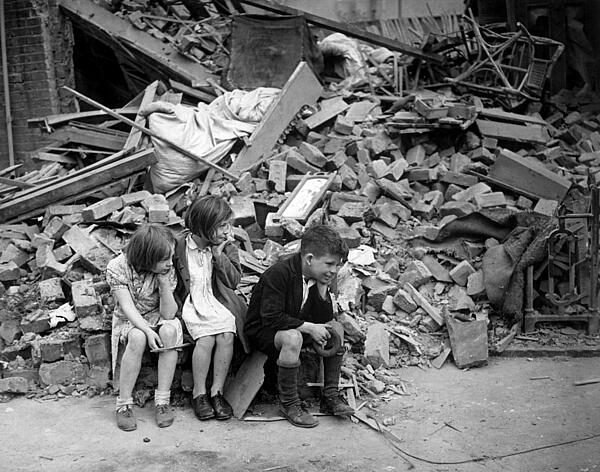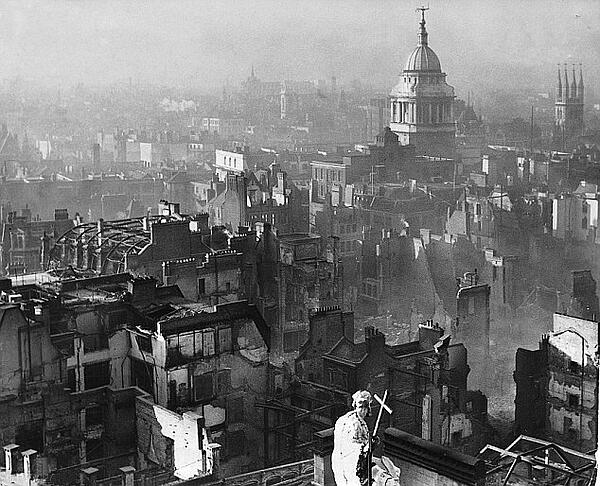The Impact of the Blitz on London
The impact of the Blitz on London was devastating. Sixty per cent of the 2,000,000 made homeless were in London and many historical and famous buildings were damaged including St. Paul’s Cathedral, The City Library in London, The British Museum, the Houses of Parliament, and St. James’s Palace. Hitler hoped that a direct attack on civilians would terrorise Britain into submission, however, despite the devastation caused by the Blitz, the British people did not lose morale.
On 24 August 1940, German bombers targeted oil depots to the East End, but some homes were hit after they missed their targets. Hitler did not intend to attack the civilian population at this point. On 25 August, Bomber Command flew a retaliatory raid on Berlin on the orders of Winston Churchill. Hitler retaliated by announcing a planned attack on London’s civilian population. The first raid took place on 7 September.
Known as ‘Black Saturday’, the first German air raid came was unexpected and resulted in a large number of casualties. The attack started at 16:43 and lasted for 12 hours. The ‘all clear’ was sounded at 05.00 on 8 September – 420 people were killed and over 1600 seriously wounded.

From this point, there were air raids every day for two months. Realising that flying in daylight was more dangerous, the Luftwaffe altered its approach. All air raids were carried out at night, when it was almost impossible for Fighter Command to intercept.
London was defended by only 93 anti-aircraft guns of Black Saturday, prompting Churchill to order more defences. After only four days the number of AA guns was doubled and it was ordered that they be fired continuously during a raid. Even if they were not aimed at a plane. It was hoped that this would boost morale.
In time, the Luftwaffe began to drop more dangerous bombs. A Heinkell III could carry four SC-500 bombs, which each carried 250 kg of TNT. As the Blitz continued, SC-500s were used together with incendiary bombs.
Londoners took shelter in the Underground stations. At the start of the war, the government did not open the stations to civilians, fearing they would develop ‘Deep Shelter Mentality’ and refuse to leave the Underground. However, after immense pressure they allowed Londoners to shelter in the underground stations. 250,000 Londoners were homeless by October 1940.
When it was clear that Londoners would not give in to the Luftwaffe, Hitler ordered an expansion of bombing. In November 1940, other British cities were included in the raids, such as Coventry, Plymouth and Liverpool.
Christmas Day 1940 saw the only respite from the continuous bombing. However, the raids resumed on Boxing Day 1940 and Luftwaffe now focused more on incendiary bombs as opposed to high explosive bombs.

On 29 December 1940 Hitler ordered a huge raid on London. On this date, the River Thames was at its lowest level, making it more difficult for firefighters to deal with the fires caused by incendiary bombs.
The number of deaths caused by the Blitz was actually far lower than the government had fears. 22,000 people had dids, but a report in 1938 had predicted that there would be as many as two million deaths. There are a number of reasons why death tolls were lower than the government were expecting. For one, the shelter policy was very successful, with both Anderson shelters and the London Underground saving many lives.
Families with an income of less than £250 could get a free Anderson shelter. The government issued more than three million Anderson shelters. If they were built properly they offered good protection from falling bombs.
By February 1941, the Blitz had wrought severe damage on British cities, but to Hitler’s frustration, morale among British people was still high. As a result, the Luftwaffe began to target ports to starve the country into submission. Targeted cities included Plymouth, Liverpool and Belfast.
A retaliatory raid against Bremen and Hamburg was made on 8 May 1941 in an attempt to raise morale. Hitler retaliated against the raid by launching one last major attack on London. Shortly after this attack Hitler began his attack on the Soviet Union, marking an end to the Blitz.
See also: Memories of the Blitz
MLA Citation/Reference
"The Impact of the Blitz on London". HistoryLearning.com. 2026. Web.
